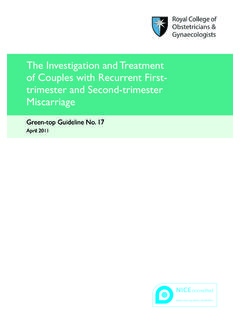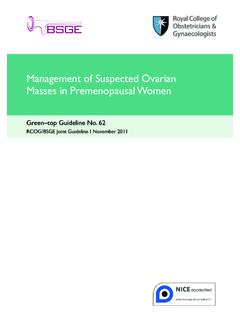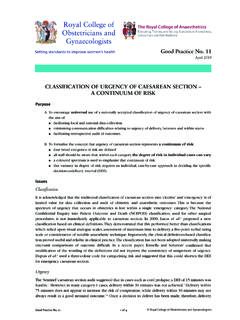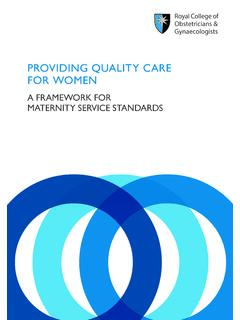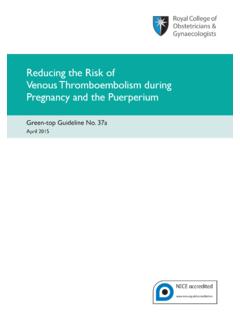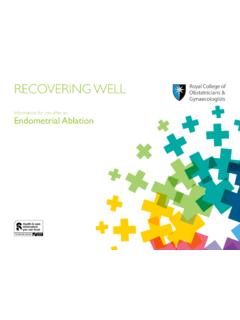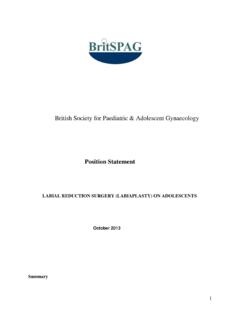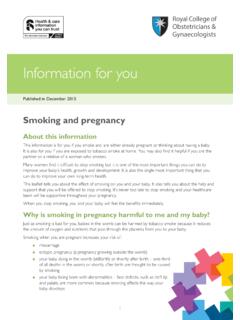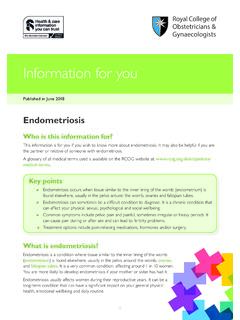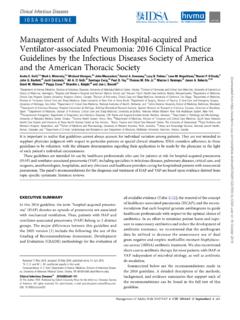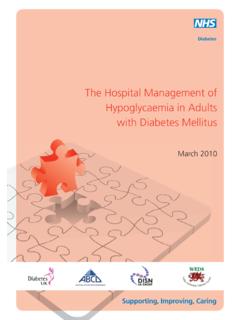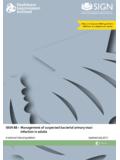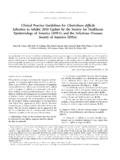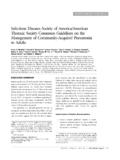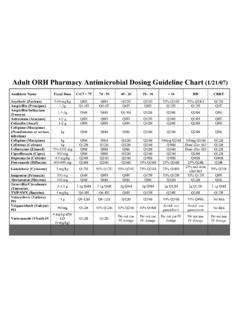Transcription of Management of Genital Herpes in Pregnancy - RCOG
1 Management of Genital Herpes in Pregnancy October 2014. Management of Genital Herpes in Pregnancy Foley E, Clarke E, Beckett VA, Harrison S, Pillai A, FitzGerald M, Owen P, Low-Beer N, Patel R. Guideline date: October 2014. Date of review: by 2018. Guideline development group: Elizabeth Foley MB BS BSc FRCP FRCOG (lead author), Consultant in Genitourinary and HIV Medicine, Solent NHS Trust Emily Clarke BSc BM MSc MRCP (UK), ST3 Genitourinary Medicine, Solent NHS Trust Virginia Beckett MB BS BSc FRCOG (lead author on behalf of RCOG), Consultant Obstetrician and Gynaecologist, Bradford Teaching Hospitals NHS Foundation Trust, Honorary Senior Lecturer, University of Bradford Sam Harrison MRCOG, ST6 Obstetrics and Gynaecology, Bradford Teaching Hospitals NHS Foundation Trust Anil Pillai MRCP, Consultant Neonatologist, Bradford Teaching Hospitals NHS Foundation Trust Mark FitzGerald FRCP, Lead Editor, BASHH guideline on Management of Genital Herpes (2014), BASHH Clinical Effectiveness Group, Consultant Physician in Genitourinary Medicine, Musgrove Park Hospital, Taunton Philip Owen MD FRCOG, Chair (to May 2014)
2 , RCOG Guidelines Committee, Consultant Obstetrician and Gynaecologist, Princess Royal Maternity, Glasgow Naomi Low-Beer MBBS MD MRCOG MEd, Consultant Gynaecologist, Chelsea and Westminster Hospital NHS Foundation Trust, Honorary Senior Clinical Lecturer, Imperial College London Rajul Patel FRCP, Senior Lecturer, University of Southampton, Consultant in Genitourinary and HIV Medicine, Solent NHS Trust 2. Contents 1. Objective and scope 4. 2. Search strategy 5. 3. Background 6. 4. Management of pregnant women with first episode Genital Herpes 8. 5. Management of pregnant women with recurrent Genital Herpes 10. 6. Management of women with primary or recurrent Genital lesions at the onset of labour 11. 7. Genital Herpes in preterm prelabour rupture of membranes 13. (before 37+0 weeks of gestation). 8. Management of HIV-positive women with HSV infection 14. 9. Management of the neonate 15. 10. Prevention of postnatal transmission 17. 11. Performance measures 18.
3 12. About this guideline 19. References 21. Appendix I 25. Appendix II 26. What's new in the 2014 Management of Genital Herpes in Pregnancy guideline? This guideline has been written as a consensus guideline between the British Association for Sexual Health and HIV (BASHH) and the Royal College of Obstetricians and Gynaecologists (RCOG). where previously there were two separate guidelines which in part gave conflicting advice. Stronger recommendation to offer a vaginal delivery to women with recurrent Genital Herpes in Pregnancy . New section on Genital Herpes in preterm prelabour rupture of membranes. New section on the Management of HIV-positive women with Genital Herpes . Flow chart for Management of Herpes in mother and neonate (Appendix 1). 3. Management of Genital Herpes in Pregnancy 1. Objective and scope In 2007, the British Association for Sexual Health and HIV (BASHH) published its guidance on the Management of Genital Herpes , including a section on Management in Pregnancy , and the Royal College of Obstetricians and Gynaecologists (RCOG) published their Green-top Guideline on the Management of Genital Herpes in ,2 In 2010, a European guideline on the Management of Genital Herpes was published, which included a section on Management in In order to achieve consensus, it was decided that a joint BASHH and RCOG guideline on the Management of Herpes in Pregnancy should be written to update the previous guidance from the two organisations.
4 For more detailed information on the general Management of Genital Herpes infection in nonpregnant patients, this guideline should be considered in conjunction with the 2014 BASHH. guideline on the Management of Genital Herpes (currently undergoing consultation). The scope of this guideline is the inpatient and outpatient Management of Genital Herpes simplex virus infection in the antenatal, intrapartum and postnatal periods. For the prevention of Genital Herpes infection in uninfected mothers during Pregnancy , please see the transmission prevention advice in the 2014 BASHH guideline on the Management of Genital Herpes (currently undergoing consultation). The population covered by this guideline includes pregnant women with a suspected or confirmed diagnosis of Genital Herpes simplex infection in primary or secondary care. This guideline is aimed at healthcare professionals working in maternity units and departments offering level 3 care in the Management of sexually transmitted infections within the UK.
5 However, the principles of the recommendations should be adopted across all services, including community care. Stakeholder involvement Clinicians from the Herpes Special Interest Group of BASHH and the RCOG Guidelines Committee have been involved in writing this guideline. The draft guideline was sent for consultation to the Herpes Viruses Association (HVA) for patient involvement. The guideline was posted on the BASHH. and RCOG websites for 3 months for consultation, with a direct request to the Royal College of Paediatrics and Child Health (RCPCH) for external peer review. 4. Management of Genital Herpes in Pregnancy 2. Search strategy This document was produced in accordance with the guidance set out in the BASHH Clinical Effectiveness Group's (CEG's) document Framework for guideline development and assessment'. (available from: ). A literature search was performed using PubMed/MEDLINE, EMBASE, Google, The Cochrane Library and relevant guidelines from January 1981 to January 2014.
6 A MEDLINE/PubMed and EMBASE search was carried out from January 1981 to January 2014 using the following search terms/Medical Subject Headings (MeSH): HSV/ Herpes ', Genital ulcers', HSV/ Herpes Pregnancy ', neonatal HSV/ Herpes ', HSV/ Herpes drugs', Pregnancy complications: infectious', Herpes genitalis' and Herpes simplex diagnosis'. The search was limited to humans and the English language. For some specific recommendations, an additional MEDLINE/PubMed search was performed when necessary. A Google search was performed in January 2014 with the search term HSV guideline(s)' and all relevant documents of the first 150 search results were reviewed. A search of The Cochrane Library included the Cochrane Database of Systematic Reviews, Database of Abstracts of Reviews of Effects and Cochrane Central Register of Controlled Trials. The following guidelines were reviewed in detail: 2010 European guideline for the Management of Genital Herpes ; 2007 BASHH guidance on the Management of Genital Herpes ; and the 2007 RCOG.
7 Green-top Guideline on the Management of Genital Herpes in Pregnancy . The members of the guideline development group selected studies relevant to the scope of the guideline. Article titles and abstracts were reviewed and if relevant the full-text article obtained. Priority was given to randomised controlled trial and systematic review evidence and, where possible, recommendations were made and graded on the basis of the best available evidence (Appendix 2). In areas where evidence is lacking, recommendations based on consensus opinion within the writing group have been made. 5. Management of Genital Herpes in Pregnancy 3. Background Neonatal Herpes is a very rare but serious viral infection with a high morbidity and It is classified into three subgroups in the infant depending on the site of infection: disease localised to skin, eye and/or mouth local central nervous system (CNS) disease (encephalitis alone). disseminated infection with multiple organ involvement.
8 Disease localised to skin, eye and/or mouth Infants who present with symptoms localised to the skin, eye or mouth alone have the best prognosis and represent approximately 30% of neonatal Herpes With appropriate antiviral treatment, neurological and/or ocular morbidity is less than 2%.6. Local CNS disease and disseminated infection 70% of infants with neonatal Herpes have disseminated and/or CNS infection and approximately 60%. of infants with local CNS and/or disseminated disease will present without skin, eye and/or mouth Infants with local CNS disease often present late (generally between 10 days and 4 weeks of age). With antiviral treatment, mortality from local CNS disease is around 6% and neurological morbidity (which may be lifelong) is 70%. Disseminated disease carries the worst prognosis; with appropriate antiviral treatment, mortality is around 30% and 17% have long-term neurological sequelae. The poor outcomes of disseminated and local CNS disease have been attributed to delays between symptom onset and Neonatal infection occurs as the result of an infection at the time of birth; in contrast, congenital Herpes is extremely rare and occurs by transfer of infection in utero.
9 Incidence Neonatal Herpes is rare in the UK, in contrast to some other European countries and the USA. Active surveillance by the British Paediatric Surveillance Unit (BPSU) between 1986 and 1991 found 76. cases over the five-and-a-half-year surveillance period with an incidence of 000 live births annually (95% CI ).7 Subsequent surveillance from 2004 to 2006 showed an approximate doubling of incidence with 86 cases seen over the three-year surveillance This increase may reflect the rise in the prevalence of sexually transmitted infections, demographic and social changes within the general population and improvements in diagnostic Further published incidence data are awaited. The incidence in the UK is around 50% of that reported from other European In the USA, the average reported incidence is 1 in 15 000, but there is considerable variation between populations and rates of up to 1 in 7500 have been reported in certain deprived inner-city ,9.
10 6. Aetiology Neonatal Herpes may be caused by Herpes simplex virus type 1 (HSV-1) or Herpes simplex virus type 2 (HSV-2) as either viral type can cause Genital Herpes in the mother. Approximately 50% of neonatal Herpes is due to HSV-1 and 50% due to Most cases of neonatal Herpes occur as a result of direct contact with infected maternal secretions, although in 25% of cases a possible source of postnatal infection was identified, usually a close relative of the ,7 Postnatal infection may occur as a result of exposure to oro-labial Herpes infection. Transmission Factors associated with transmission include the type of maternal infection (primary or recurrent), the presence of transplacental maternal neutralising antibodies, the duration of rupture of membranes before delivery, the use of fetal scalp electrodes and the mode of ,9 The risks are greatest when a woman acquires a new infection (primary Genital Herpes ) in the third trimester, particularly within 6 weeks of delivery, as viral shedding may persist and the baby is likely to be born before the development of protective maternal ,9.
